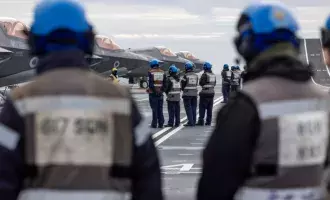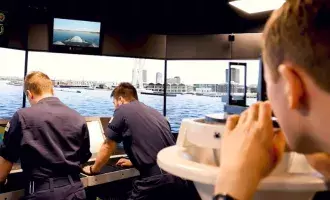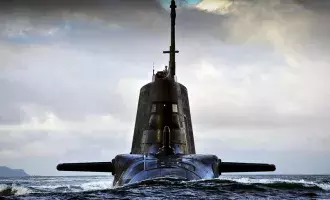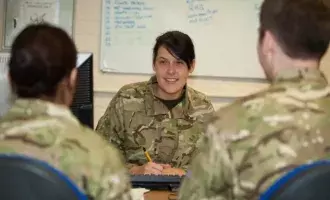The Selborne project represents a strategic partnership between Team Fisher (the Capita-led consortium) and the Royal Navy, a 12-year contract focused on transforming shore-based training for sailors and marines.
Since delivery began in April 2021, the partnership has delivered high-quality technical education and training to better prepare Royal Navy personnel for operational duty. At the heart of the project is a commitment to partnership and to the introduction of technology-enabled learner-centric education. Together, Team Fisher (which includes partners Raytheon, Elbit Systems, Fujitsu and University of Lincoln) and the Royal Navy are working to deliver better trained people to the frontline faster, whilst building the foundations for future-ready training through continuous improvement.
Adapting to a rapidly changing world
The Royal Navy operates in an ever-changing environment where agility and readiness are essential. Recognising the need to modernise its training systems, we developed a future-ready approach that aligns operational demands with the expectations of today’s learners. At its core is a commitment to focusing on flexible, personalised and engaging training experiences that meet individual needs.
In December 2023, Ofsted judged the ‘quality of training and support’ at every establishment, air station and training delivery unit in scope of Selborne to be ‘good’ including the key phase 1 and 2 establishments of HMS Raleigh, Britannia Royal Naval College, Commando Training Centre Royal Marines and HMS Collingwood.
By embracing modern technologies and innovation in teaching, learning and assessment, the partnership is redefining how training prepares personnel for the increasingly complex challenges of frontline duty. This agile approach not only builds confidence and adaptability but also supports the Navy’s strategic goals, ensuring trainees are equipped to succeed in a rapidly changing world.
Laying strong foundations in training delivery
Over the first three years of the Selborne project, significant strides were made in modernising submariner training. This foundational phase also included cultural change, updates to courses, and key technology upgrades in classrooms. The use of information and insight as well as support systems for apprentices and information tools including a virtual library and central information portal have all been elemental in building the right foundations.
Now in the second phase of the contract, the focus has shifted to reimagining training delivery across the Royal Navy’s leadership, engineering, diving and warfare delivery units. Traditional lecture-based methods are being redesigned to introduce more engaging and interactive learning environments, whilst reconfigurable classrooms and smart devices are enabling group work and exercises that foster deeper engagement and greater retention of knowledge.
Highlights from the first three years
- Educator development
Empowering Royal Navy educators has been a key focus. Our comprehensive training and ongoing professional development initiatives are supporting our educators to become dual professionals, combining deep subject-matter expertise with advanced teaching methodologies. Regular coaching, classroom observations, and feedback sessions ensure continuous growth, equipping educators to deliver engaging and impactful lessons. In 2023, a new Observation of Teaching, Learning & Assessment process was introduced leading to 2,000 observations, providing tailored feedback to educators and linked to specific Continuous Professional Development (CPD) to support more active and engaging delivery. Ofsted noted that this approach has helped educators plan more engaging and thoughtful lessons that better meet trainees’ individual needs. - Training modernisation
The introduction of advanced simulators, such as the state-of-the-art Bridge Trainer programme, has revolutionised training in navigation and ship handling. This suite of simulators replicates real-life scenarios with exceptional realism, enhancing trainees’ readiness and confidence while reducing the risks and costs associated with live exercises. Sub-Lieutenant Stephen Smallman reflected on their value, saying: “Here, you feel like you are stepping onto the bridge of a warship. It is very easy to become immersed in the situation – it makes everything feel much more real.” - Enhanced apprenticeships
The Royal Navy’s apprenticeship programme has been transformed with qualification achievement rates rising to 70%, exceeding the national benchmark by 20%. Approximately 90% of new recruits are now enrolled in the programme, highlighting its vital role in preparing apprentices for their careers. Apprentices have praised the programme for providing exposure to experienced personnel, delivering practical team-based lessons, and offering support through approachable and accommodating staff. Many apprentices have also reported gaining significant confidence, ensuring they are ready to excel in their roles. - Inclusive training for all
The Selborne project has introduced new systems and processes to better support neurodiverse trainees and those with Specific Learning Differences (SpLDs). These enhancements ensure that all learners receive the tailored care and strategies they need to succeed. Trainees have praised the welfare and support provided, as one trainee shared:
“I wanted to thank my SpLDA for their time today and expert advice. They have made sense of something that for me made no sense. I feel so confident now that with these strategies I will succeed, and that’s in part because of the support I’ve received. Brilliant.”
This proactive approach fosters a more inclusive training environment where every individual can thrive, ensuring all personnel are fully prepared for their roles and supports the Royal Navy to deliver against its mission for inclusion and diversity.
Building a unified culture
The success of Selborne is deeply rooted in its collaborative ethos, which has fostered a culture of unity, inclusivity, and shared purpose. By bringing together over 1,500 uniformed and civilian educators into a cohesive team, the partnership operates seamlessly under an integrated workforce model. This “Whole Force” approach goes beyond operational collaboration—it builds trust, strengthens relationships, and empowers individuals to take collective ownership of outcomes.
The result is a culture where innovation thrives, challenges are met with confidence, and individuals are empowered to deliver their best and all contributions are valued. The culture shaped by the Selborne partnership is delivering exceptional results today, while laying the groundwork for sustained growth, resilience, and excellence in the future.
A partnership built on innovation and trust
Selborne is much more than a contract - it’s a bold vision for the future of military training. The next phase of the contract will focus on delivering transformative impact through targeted modernisation workstreams, spanning areas such as accreditation, environment, and equipment. In parallel, we will support training transformation across key Training Delivery Units selected by the Royal Navy.
Plans include the expansion of adaptive learning capabilities and the integration of cutting-edge technologies, redefining how training is delivered. By introducing interactive, learner-centric approaches, Selborne ensures that Navy personnel are not only prepared but empowered to excel in an evolving operational landscape.
Commodore Jo Deakin, Deputy Director, People and Training, highlighted the transformative nature of Selborne: “Selborne is a genuinely shared endeavour and partnership that means we can think differently and challenge traditional military training ideas and approaches. We’re bringing in the best from training design, training delivery, academia, and industry, and the impact is already clear. We are delivering better trained people to the frontline faster, in a way that leaves our people feeling valued and invested in.”
By embracing innovation, fostering collaboration, and maintaining a relentless focus on excellence, the project is ensuring that Navy personnel are operationally ready, confident, and capable. As this transformative journey continues, the strong foundation of trust and partnership will drive further successes, ensuring the Royal Navy remains a global, modern, and future-ready force.
Unlock the full potential of your team with bespoke, cutting-edge training solutions. Let’s help shape the future of your organisation together:







